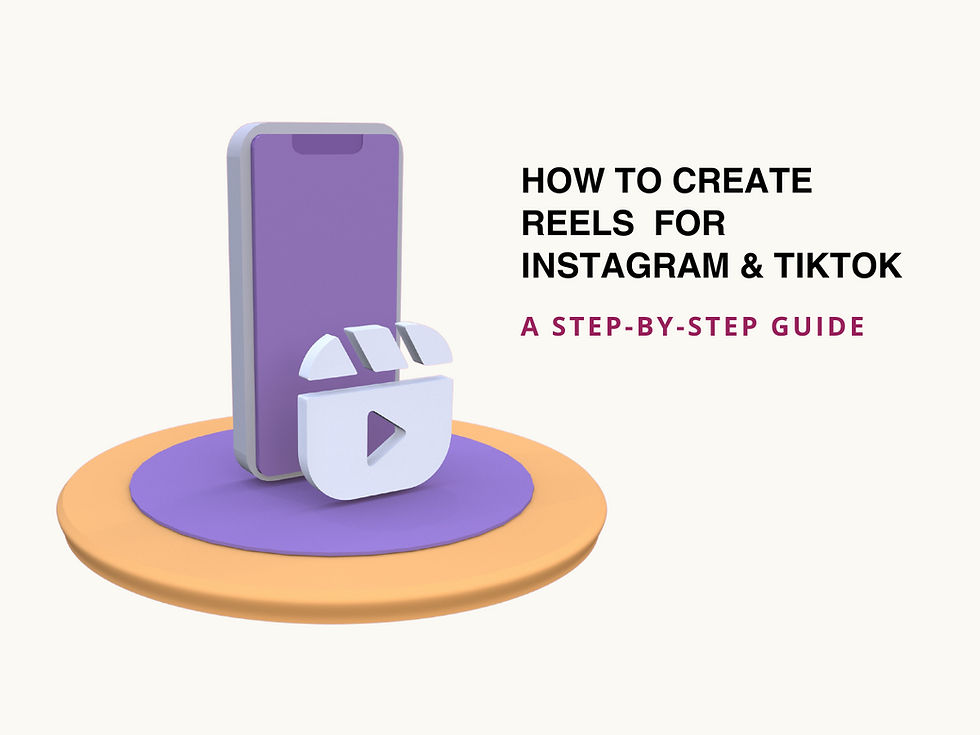What are the Best Social Media Platforms for Small Business?
- Island VA

- Oct 11, 2024
- 4 min read
Updated: Oct 21, 2024

In today’s digital landscape, social media can be a powerful tool for small businesses and solopreneurs, but the challenge lies in deciding which platforms to invest your time and resources into. Many businesses feel the pressure to be present everywhere—on Facebook, Instagram, LinkedIn, TikTok, and even YouTube—but being strategic is much more effective than spreading yourself too thin.
So, which are the best social media platforms for small business? The key to success is to focus on the social channels where your ideal audience is most active.
You don’t need to be on every platform. Be where your ideal audience is.
The Best Social Media Platforms for Small Business
The Major Social Platforms: Demographics & Best Use Cases
Let’s break down the major platforms and explore which ones are best for your small business, whether you’re targeting B2B or B2C audiences.
1. Facebook
Still one of the most popular platforms worldwide, Facebook is best for businesses targeting a broad audience. Its user base skews toward adults aged 25–54, making it ideal for B2C companies offering products and services to individuals and families. Facebook is also effective for community engagement through groups, events, and ads.
Best for: B2C businesses, community-driven brands, and businesses running Facebook Ads.
2. Instagram
Instagram is a highly visual platform dominated by a younger audience (18–34 years old). It’s perfect for brands with strong visual elements, like fashion, food, and lifestyle businesses. With features like Stories, Reels, and Shopping, Instagram works well for B2C companies looking to create a visually appealing and engaging brand presence. It’s also increasingly popular for influencer marketing.
Best for: B2C businesses, especially in lifestyle, beauty, and retail.
3. LinkedIn
LinkedIn is the go-to platform for B2B businesses. It’s designed for professional networking and is most effective for brands that offer services to other businesses. With a focus on industries like technology, finance, and marketing, LinkedIn allows for thought leadership and building business relationships through content, articles, and personal networking.
Best for: B2B businesses, consultants, and service-based professionals.
4. X (formerly Twitter)
X is a platform for real-time conversations and quick updates. It has a diverse user base, and businesses that excel on X tend to engage regularly with trending topics, industry news, or customer service. While it can be beneficial for B2C and B2B brands, it’s especially useful for businesses that want to stay part of relevant conversations and build a brand voice.
Best for: B2C and B2B businesses looking to engage in real-time conversations or customer service.
5. TikTok
TikTok has exploded in popularity, especially among younger audiences (under 30). It’s a short-form video platform where trends and viral content reign supreme. If your brand can create entertaining, educational, or inspiring content that resonates with this demographic, TikTok can offer incredible reach. It’s primarily a B2C platform but has emerging opportunities for B2B brands to share creative content.
Best for: B2C businesses, especially those targeting Gen Z.
6. YouTube
YouTube is the second-largest search engine after Google, making it a prime platform for educational content and brand storytelling. It has broad appeal across demographics, and videos can help businesses attract and engage with potential customers over time. Whether you’re producing product tutorials, how-to guides, or brand stories, YouTube SEO can boost visibility significantly.
Best for: B2C and B2B businesses, educational content creators, and brands looking to build long-form video content.
7. Pinterest
Pinterest is a visually driven platform, often used as a search engine for inspiration, DIY projects, recipes, and fashion. Its user base is predominantly women (ages 25–44), and businesses that benefit most from Pinterest include those in home decor, fashion, food, and lifestyle niches. Pinterest’s “Buyable Pins” make it a great platform for eCommerce businesses.
Best for: B2C businesses in lifestyle, fashion, and eCommerce.
8. Google My Business (GMB)
While not a social media platform, Google My Business is essential for local businesses. It allows you to post updates, promotions, and business news directly to Google, helping you improve local SEO and show up in search results when customers are looking for services near them. Keeping your GMB profile updated with regular posts can drive traffic to your website and improve your online visibility.
Best for: Local businesses, brick-and-mortar stores, and service-based businesses.

Should You Focus on B2B or B2C Platforms?
When deciding which platforms to focus on, consider whether your business primarily serves consumers (B2C) or other businesses (B2B). Here’s a quick breakdown:
B2B Businesses should prioritise LinkedIn for professional networking, thought leadership, and B2B lead generation. YouTube is also excellent for sharing educational content and building authority in your field.
B2C Businesses will benefit most from visual platforms like Instagram and Pinterest for product promotion, as well as Facebook for community building and targeted ads. TikTok is an excellent option if your brand can capitalise on viral trends and reach younger audiences.
You Don’t Have to Be Everywhere
It’s tempting to be on every social media platform, but the reality is that quality over quantity wins every time. Focus on the platforms where your ideal audience hangs out and that align with your business goals. If you’re not sure where to start or feel overwhelmed with managing multiple platforms, outsourcing social media management to a Virtual Assistant can save you time and ensure your presence is impactful across the right channels.
As a Virtual Assistant, I specialise in helping solopreneurs and small businesses build their online presence through tailored social media management. Whether you need help with content research and copywriting, creating branded images and videos, scheduling posts, or even handling Facebook Ads and YouTube SEO, I’m here to support your social media needs. You don’t have to manage it all on your own. Visit my Services page to learn more about how I can help you with social media management.
Related Posts You Might Find Helpful:




